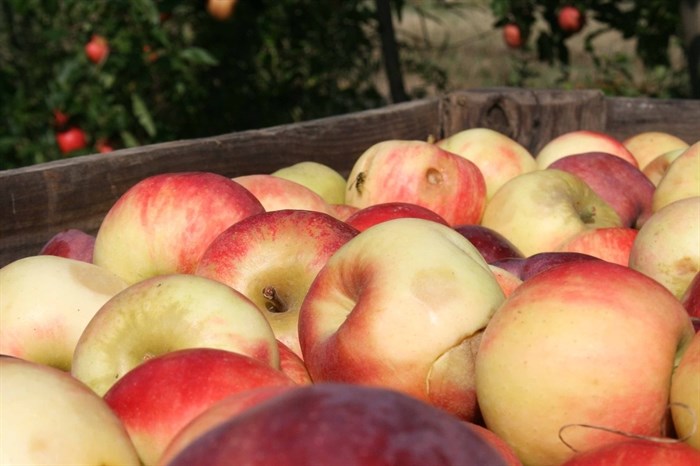Okanagan apple growers seek help after years of dismal returns

Okanagan apple growers protested current apple economics at last weekend's Kelowna Farmers Market.
Growers offered apples at 12 cents a pound, calling it "B.C.s Apple Farewell Tour.”
B.C. Fruit Growers Association general manager Glen Lucas says purchases were limited to one bag per customer.
“The point was to try to get information across, and show some great B.C. product as well,” he says.
The apples were purchased from the growers for 60 cents a pound, with all proceeds going to the food bank.
“We think people got the message, because when they found out what it was all about, many said, ‘well, if it’s for the food bank, here’s $20.’ We raised a lot more money than 12 cents a pound,” he says. “We’re in a four-year downturn here, and we could use some help.”
Lucas says prices for this year’s crop are based on the 2019 crop, with prices moving up or down according to current markets starting in November.
This is the fourth year of low prices, with the average price of apples today at 12 cents a pound.
“That’s brutal. The cost of production is, conservatively, 30 to 35 cents a pound, so we’re at a third of the cost of production. That’s not survivable,” Lucas says.
He says apple production acreage is down by around 600 acres this year, as the industry sees orchard blocks being removed from apple production.
Lucas attributes the low prices to American pricing. He says the Columbia River Treaty, which has provided water for late season irrigation in Washington State, has contributed to a massive increase in apple acreage in the U.S. in the last 50 years while our production has declined by 50 per cent.
"They’re the price leaders. If we’re getting 12 cents a pound, it’s because something is going on in the U.S, that’s causing that downward trend,” he says.
Other factors include a 7 cent a pound subsidy provided to Washington State apple growers by the U.S. federal government that B.C. growers didn’t get.
Lucas says the competitive advantage given the U.S. through the Columbia River Treaty, their subsidies and their massive expansion in apple production acreage are big parts of the problem.
One positive aspect of the Canadian market has been purchaser preference for locally grown apples, Lucas says, but Canada is at a disadvantage when it comes to the retail market because the Canadian industry is so concentrated.
"Retailers in Canada often dictate the terms to suppliers. It can be very punishing to do business in Canada,” he says.
Lucas says retailers are forcing the industry to look more at foreign markets for their products.
B.C. also lags in providing program support to apple growers, Lucas says.
“The government hasn’t really matched the rhetoric of preserving Agricultural Land Reserve lands by coming to the table with programs,” he says.
To contact a reporter for this story, email Steve Arstad or call 250-488-3065 or email the editor. You can also submit photos, videos or news tips to tips@infonews.ca and be entered to win a monthly prize draw.
We welcome your comments and opinions on our stories but play nice. We won't censor or delete comments unless they contain off-topic statements or links, unnecessary vulgarity, false facts, spam or obviously fake profiles. If you have any concerns about what you see in comments, email the editor in the link above.


